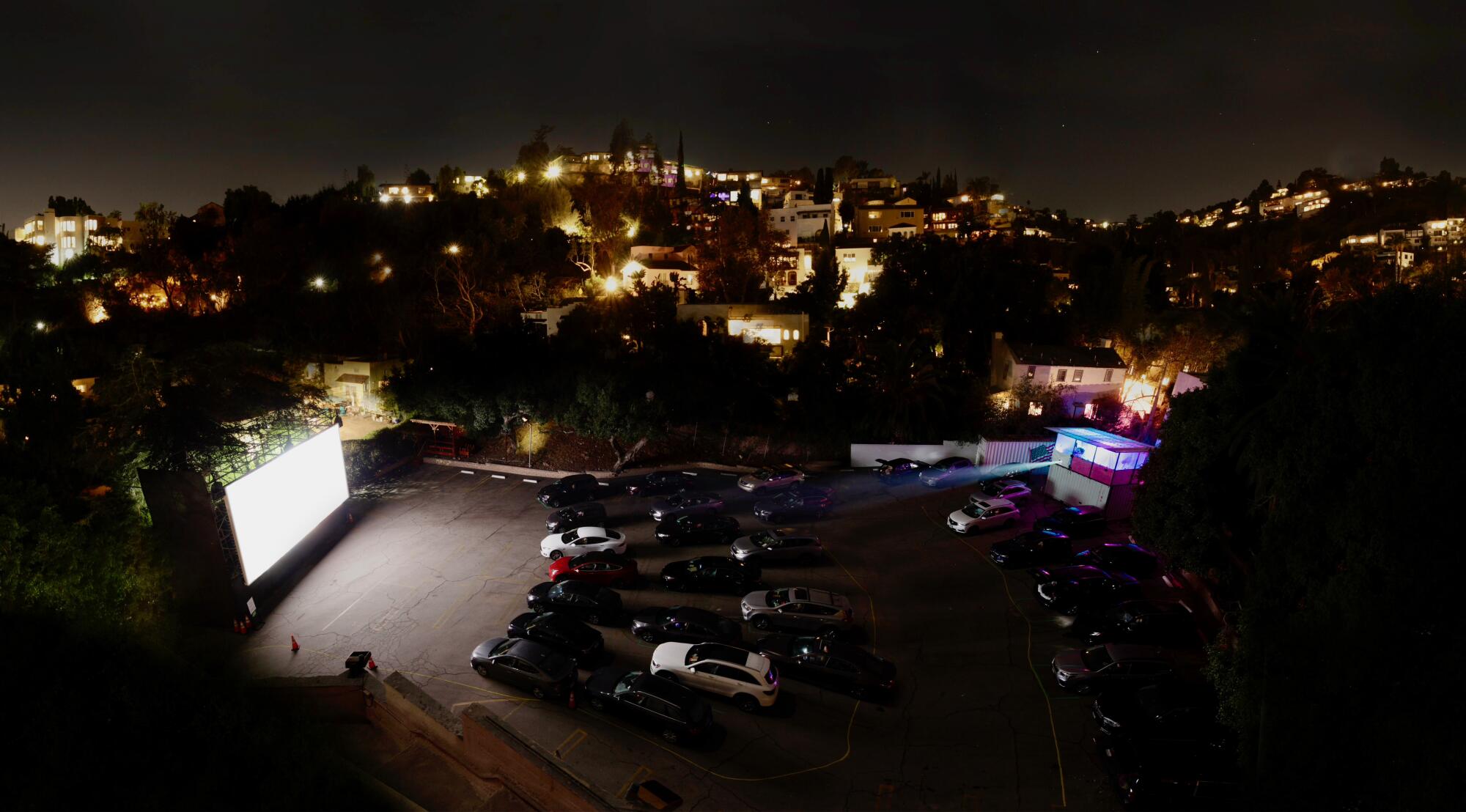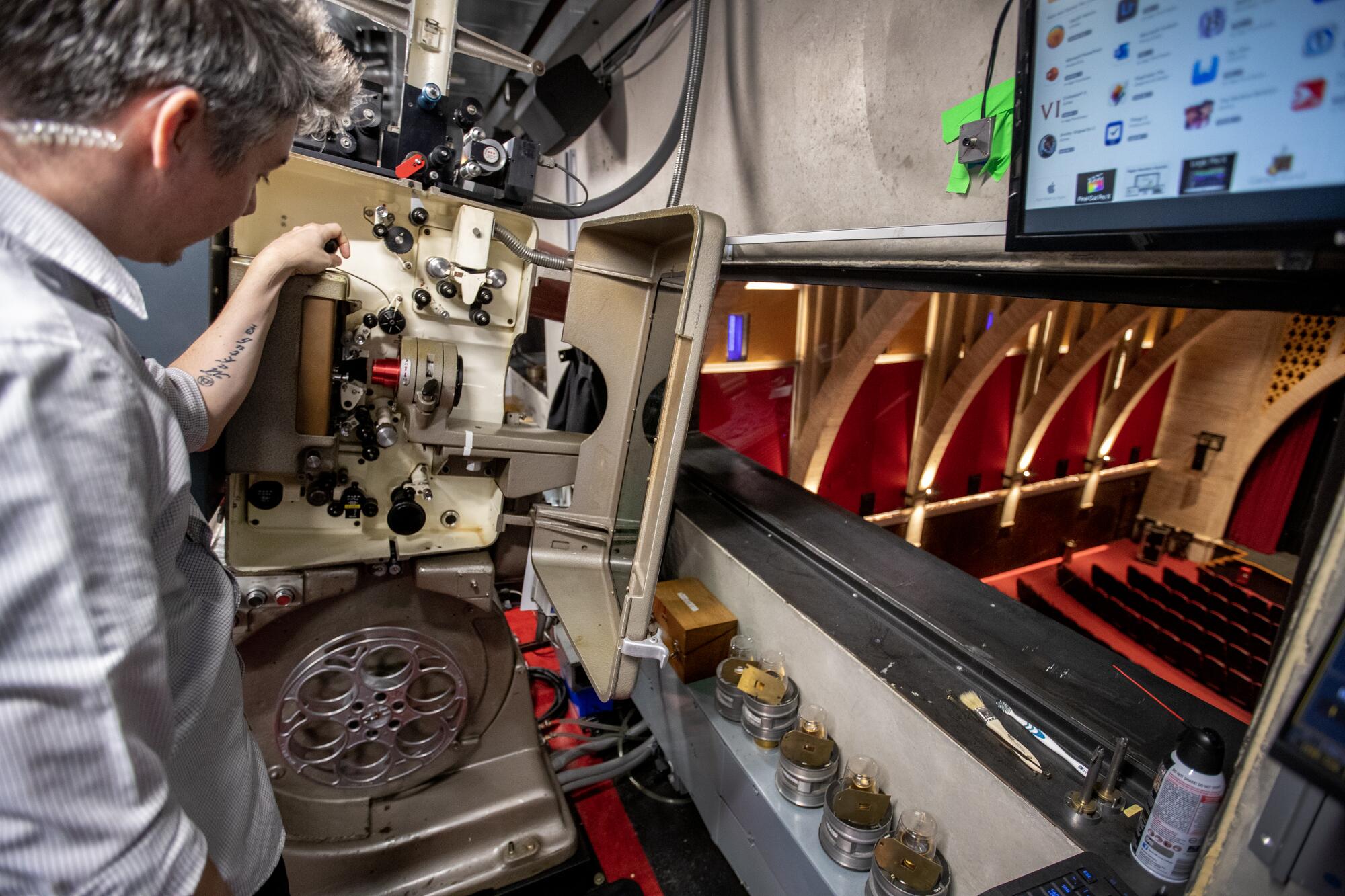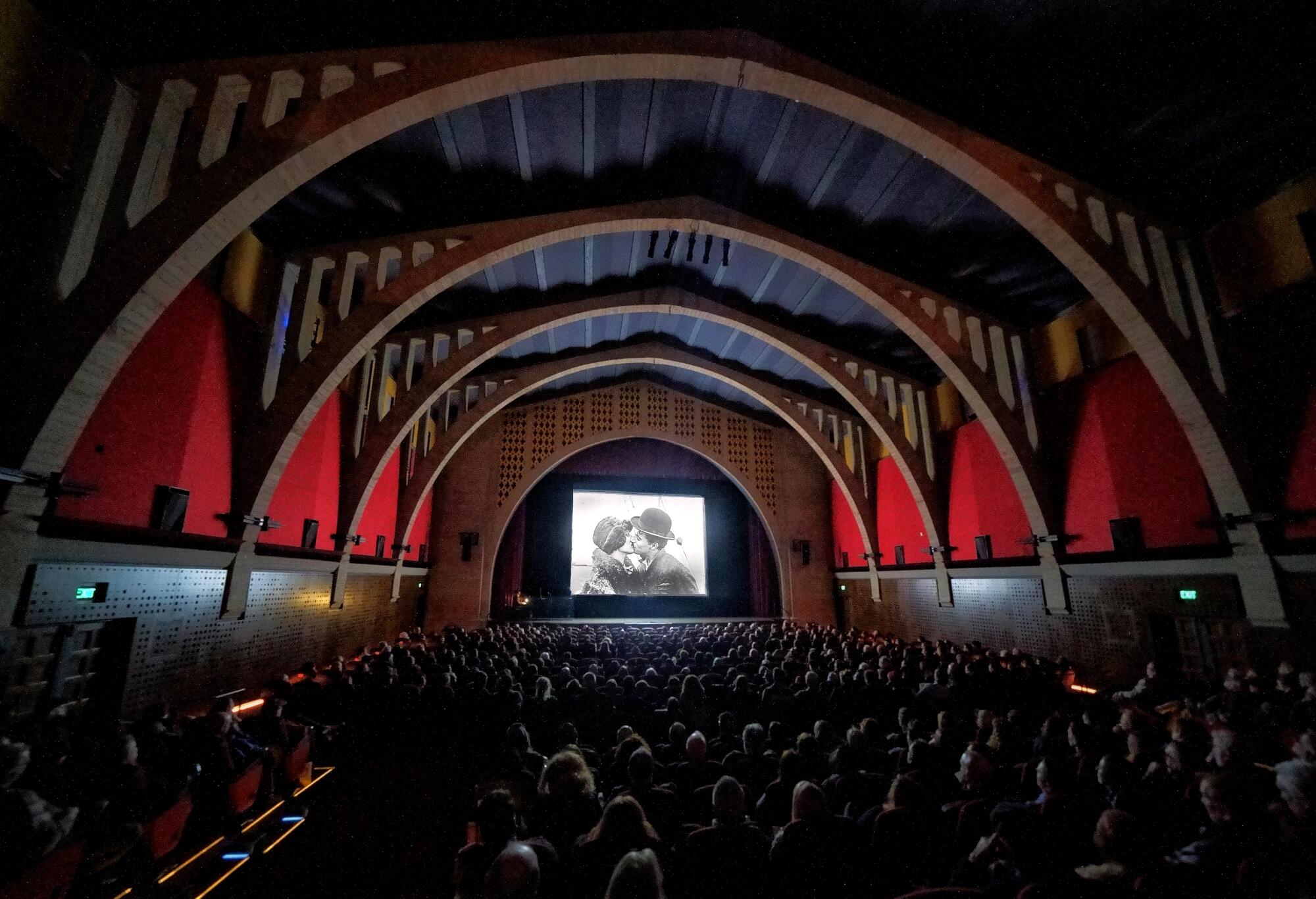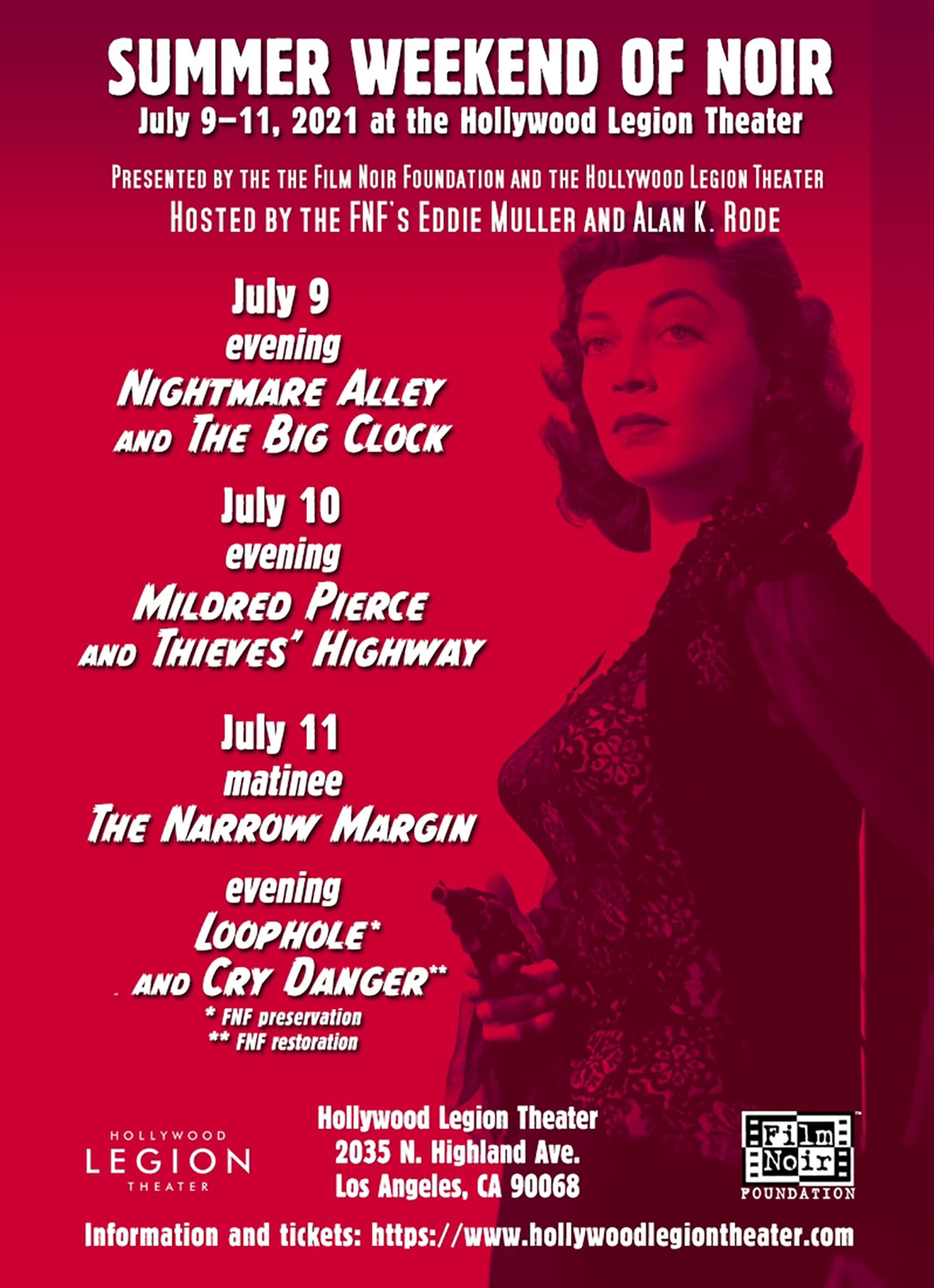(Ross May / Los Angeles Times; photos by Allen J. Schaben / Los Angeles Times; Getty Images)
It was meant to be a transformative moment for the American Legion — and for a few shining years, it was. In late 2018, American Legion Hollywood Post 43 unveiled a new theater to its military veteran members and the public. The state-of-the-art, 482-seat venue cost $6 million to build — including renovations to the organization’s nearly century-old Egyptian Revival headquarters — and was equipped to project 35-millimeter and 70-millimeter film, as well as digital movies, with lush Alcons sound.
Publications including The Times lauded Post 43 and its new theater. The Wall Street Journal called it “Hollywood’s hottest private club,” and KCRW wrote, “Veterans bring Hollywood sizzle to Legion Post.” Premieres were held for Baz Luhrmann’s Oscar contender, “Elvis,” and the “Yellowstone” prequel series, “1923.” It hosted the TCM Classic Film Festival several times. In February, the Hollywood Legion won the prestigious Kodak Theatre Award “in recognition of exhibition standards and patron services that elevate the cultural and communal experience of cinema.”

According to Post 43’s tax filings, total revenue jumped from nearly $685,000 in 2017, the year before the theater opened, to more than $2.7 million in 2021, the last year for which tax documents are available.
Two flashpoints in the fight for the soul of the theater surfaced this year, sparking resignations and upheaval: The Post’s then-commander, Jeff Daly, was accused of sexually harassing a theater employee and a volunteer, and the veteran membership of Post 43 protested the salary of the theater’s projectionist and called his union contract into question.

Subscribers get exclusive access to this story
We’re offering L.A. Times subscribers special access to our best journalism. Thank you for your support.
Explore more Subscriber Exclusive content.
Five members of Post 43’s governing executive committee, including a pair of former commanders, have resigned since May, along with the theater committee chair. The Post chaplain has also stepped down. Thirteen of the theater’s 16 employees have quit, including two managers and both projectionists. The theater has no programming set for the rest of 2023. The popular drive-in built in the parking lot during the COVID-19 pandemic shutdown was dismantled in June to make room for 10 more parking spaces to accommodate Hollywood Bowl overflow parking — one of Post 43’s primary sources of income before the theater was built.

How did this ambitious passion project meant to connect the Post’s historical Hollywood roots with an industry-driven, service-oriented future go so terribly awry? Interviews with more than a dozen former Post 43 leaders, members and theater employees — as well as hours of footage from meetings and dozens of emails, tax filings, budgets and business proposals reviewed by The Times — revealed what many sources described as a toxic and dysfunctional operation.
More specifically, sources said, a volunteer-run nonprofit organization with opaque bylaws subject to frequent changes in leadership was completely antithetical to the management of what was a multimillion-dollar entertainment business.
Post 43’s leadership declined several interview requests but answered questions via email through a PR crisis management firm. They called sources’ characterization of what happened at the theater false, writing, in part, that “the new executive leadership is working hard to right the ship at American Legion Hollywood Post 43. This is no easy task due to years of mismanagement by former leaders who appear to us to have chosen to serve themselves at the expense of those who served their country honorably. Veterans of all conflicts since the first World War have turned to Post 43 for support and service; we strongly believe that recent leadership let our veterans down and besmirched their sacrifices through their unconscionable running of the Post for their own personal gain.”
The 2023 writers’ strike is over after the Writers Guild of America and the Alliance of Motion Picture and Television Producers reached a deal.
Hollywood comeback gone wrong
While celebrities strutted down the red carpet, a battle was raging inside Post 43 between two distinct factions: members who thought of the theater as a grand experiment — a way to change the way the public sees the American Legion — and members who thought the theater was sucking money and resources away from Post 43 veterans.
In particular, the latter group disapproved of the $130,000-plus annual salary paid under a union contract to the theater’s chief projectionist, Taylor Umphenour, who was described by former colleagues as the theater’s Swiss Army knife. Alan Rode, the former chair of the theater committee that plans and oversees operations, said Umphenour attracted and organized premiere screenings, film festivals and other events, set up the drive-in and handled PR and day-to-day management of the venue. (Post 43’s executive committee contested Rode’s statement and said they “had experienced outside consultants, including events and public relations firms, who organized premieres, film festivals and other revenue-driving events.”) Umphenour was also instrumental in creating the public programming that qualified Post 43 for a $1-million government grant during the pandemic that Rode said kept the lights on at Post 43 during the global health crisis.
A number of veterans complained that they viewed Umphenour’s salary as high, sources said. A vocal contingent wanted to see a volunteer veteran trained for the job. “They think that he’s up in the booth and he presses a button and the show begins,” former theater manager Eric Sanchez said. “They don’t realize there’s so much more technical work that goes along with that.”

IATSE Local 33, the union representing L.A. stage technicians and projectionists, and Post 43 have filed dueling unfair labor practice charges with the National Labor Relations Board. In the documents filed with the NLRB in August, which The Times reviewed, IATSE 33 alleges that Post 43 bargained in bad faith by “failing to send persons with authority to the bargaining table; failing to support the tentative agreement in the internal approval process; and misrepresenting the content of the tentative agreement in the internal approval process.” On Sept. 14, IATSE 33 organized a picket line in front of the building.
According to Local 33 business representative Ronald Valentine, when Post 43 leaders appeared at the table, they said they couldn’t make decisions and had to take all options back to membership.
Post 43’s counter-complaint against IATSE 33 alleges “refusal to bargain/bad faith or surface bargaining.”
IATSE Local 33 shared a timeline of bargaining events with The Times that details a year of extensive engagement on the part of the union. Valentine wrote in an email that Local 33 believes “there is no merit” to Post 43’s charges.
“We have worked hard to negotiate with Local 33 for over six months and have consistently been pressured to sign an outsized, one-sided deal,” the Post 43 executive committee wrote in a email.
Key takeaways from the tentative contract that would end the writers’ strike, and how it addresses writers room staffing, streaming residuals and artificial intelligence.
The dispute over the projectionist played out alongside the sexual harassment allegations. Post 43’s then-commander, Daly, was accused of trying to kiss a young theater employee multiple times at the bar, and became the subject of a third-party investigation conducted by Wagener Law. (The theater employee is a relative of a Times staffer.)
According to the 37-page report, which The Times reviewed, Daly told the investigator that the accusations were fabricated by the theater staff in an attempt to discredit him after he suggested cost-cutting measures that would have reduced employee hours, and because he was negotiating a labor contract that would “negatively impact” Umphenour. The investigation, however, found the allegations to be “extensively corroborated” and substantiated, and concluded that “Mr. Daly’s statements were less credible than the complainant’s.”
According to the report, the employee claimed that Daly attempted to pull her in for a kiss on the lips several times, even after she repeatedly said “no” and pulled away. She said Daly then tried to kiss her cheek, and when she said no, he asked her to kiss his cheek, the report reads.

The executive committee asked Daly to stay off the property during the investigation. According to an email reviewed by The Times, Daly was furious, writing to the committee that it had overstepped its bounds and accusing it of attempting to influence upcoming elections.
A few days later, Legion member Jennifer Campbell introduced a motion at a social meeting to allow Daly back on Post 43 premises, even though the investigation had not concluded. A video of the gathering shows a heated debate before the motion is finally passed. Daly soon appeared at the Post and went to the bar.
The report says the woman who had accused Daly of harassment was working that night and felt intimidated. She said she noticed Daly following her, which made her feel “unsafe” and caused her to run outside crying, according to the report.
After Daly was allowed back on Post 43 property, a second complainant came forward and asked to speak to the investigator, according to the report. The woman said she was working at the bar as a volunteer on the night the young theater employee was allegedly harassed. She said Daly was visibly intoxicated and tried to kiss her that same night. She said she adamantly said no. The investigation notes that the second complainant’s allegations were also credible.
Daly declined an interview request by The Times. Post 43’s executive committee wrote in an email, “Former Commander Daly adamantly denies any allegations of inappropriate behavior.” It also noted that the investigation and its findings are under review, and that the organization has a detailed process for removing a member of leadership, if necessary.
There’s a lot of work to do before Hollywood can get fully back to work (SAG-AFTRA, anyone?). Now the industry is left to pick up the pieces of a long and disruptive work stoppage.
Executive committee member Simone Lara, who recently resigned, said Post 43 was deeply in the wrong.
“The same tactics that are used to protect men who commit misconduct against women are still going to be used to deny justice and accountability,” Lara said. “It’s like the same broken record plays even after they take off the uniform.”
According to sources, the Post paid a settlement to the young theater employee. Daly remains on Post 43’s executive committee and was recently elected National American Legion College Alumni Assn. president. (Legion College trains Legionnaires on operating American Legion Posts.)
“It’s really sad to watch from afar what’s happened to Post 43,” said the theater’s former project manager, Navy veteran Bill Steele. “It’s become a short, nasty and brutish version of what I joined some years ago.”
A glamorous Hollywood Legion Theater was first envisioned in 2016 by former Commander Fernando Rivero. Steele said he eagerly came on board because of Post 43’s rich connection with Hollywood. Humphrey Bogart and Clark Gable were members, and women who entertained troops, including Marilyn Monroe and Ginger Rogers, were honorary colonels. In 1980, Post 43 was instrumental in supporting former actor Ronald Reagan during his campaign for president.
Post 43 also harbored a dark side: It was a vocal supporter of the Hollywood blacklist and passed a resolution calling on Hollywood studios to fire suspected communists. Critics say a stubborn illiberal — and paranoid — streak remains embedded in the organization to this day.
Steele saw hope in the creation of a theater, and in the fact that the building was both a clubhouse and a memorial to veterans. Plus, he loved the end goal of writing much bigger checks to charitable organizations supporting veterans.
“We thought there were dimensions to this project that could change the way that veterans see themselves and what they were capable of, and therefore, change the way that people see veterans,” Steele said.

Outspoken members and some leaders of the group viewed the change as a threat.
Ex-house manager Sanchez often heard shouting and heated arguments coming from the conference room where the executive committee met, and he said employees were not always treated with respect.
“The place is a clubhouse for them,” he said of the veteran members. “It was a place where they can go for $4 drinks. And so the whole idea of having this theater inside of their building, they probably feel like something’s been taken away from them.”
A union house divided
American Legion Hollywood Post 43, like American Legions nationwide, operates as a nonprofit. Protecting that status is of immense importance, so in order to run a multimillion-dollar theater, experts say Post 43 should have created a wholly owned subsidiary. The intention, onetime finance officer Terrence Pallend said, was to create a separate business for record-keeping and tax purposes.
But that never happened. The theater has remained subject to the whims of a new regime of volunteers that is voted in like clockwork each May. Since the theater’s founding, sources say, Post 43 support has been like a whipsaw: One year a commander will support operating the theater; the next, a new commander will prioritize other interests.
Sign up for This Evening's Big Stories
Catch up on the day with the 7 biggest L.A. Times stories in your inbox every weekday evening.
You may occasionally receive promotional content from the Los Angeles Times.
Pete Lisowski, for example, who served as commander from May 2021 to May 2022, said his goals aligned with the earliest vision for the theater. Lisowski, who has since resigned from leadership, sought to set the theater up as a Post-owned business, overseen by board members — but independently run by professionals like Umphenour. But when Daly became commander in 2022, those plans stopped moving forward.
One theater employee said they didn’t know whether staffers would keep their jobs from week to week and month to month. In this atmosphere of uncertainty, the theater staff became anxious, and resentment grew within the ranks of Post membership, sources said.
Volunteer members “might be able to run a small Legion with a pool table and a bar in Wheeling, W.Va., or Mayberry R.F.D., but here you have an historic building in the heart of Hollywood with a world-class venue,” said Rode, the former leader of the theater committee, who resigned in May. “And these people think that they can run it themselves, which they can’t, and they think that the people who work for them are always under suspicion of stealing money or something.”
Even contracts that win over the most skeptical writers and actors won’t be able to fix some of the biggest fractures facing the industry today.
The executive committee shared a complaint filed with the California attorney general’s office by longtime member Terry Duddy — advisor to current Post 43 Commander Dennis Kee — alleging “a hostile takeover of the Post and its assets.”
“There is a group of members who are acting together to impose a for-profit entity that will control the Post and its assets for personal gain. Backdoor deals and unauthorized expenditures of Post funds are occurring and more are planned,” the complaint reads.
Some Post 43 members claimed the theater was built to benefit the fortunes of a select group, including those on the theater committee and Umphenour, sources said.
Rode said the charges “have been made without one scrap of corroborating evidence whatsoever,” adding that he finds the allegations and the damage they are doing to certain veterans’ reputations “reprehensible.”

Umphenour resigned from his position as chief projectionist and creative director in July. Those who worked with him, including projectionist Scott DuVall, said Umphenour — and the operational costs of the theater itself — served as a lightning rod for bigger issues.
The way the union contract for the chief projectionist has been presented to the “boots-on-the-ground Legion members who ultimately vote on these things has been grossly misstated,” DuVall said. “And seems, at least from my perspective, to have been made a scapegoat for any of the other professional or financial woes that the Legion has experienced.”
DuVall quit Sept. 14. In his resignation letter reviewed by The Times, he referenced the ongoing labor dispute with IATSE Local 33 and the lack of a chief projectionist.
Before construction on the Hollywood Legion Theater was completed, Post 43 had entered into an agreement to be a union house with IATSE Local 33. Local 33 gave the Post a fairly bare-bones contract — outlining pay, benefits and working conditions — meant to provide a runway for success, explained Local 33’s Valentine. That contract held for three years, expiring in 2021.
The contract was initially extended for six months. One extension turned into two, which turned into three as Post 43 continued to disagree about the future of the theater and Umphenour’s wages, Valentine said.
“So over a 2½-year period, Local 33 has been very patient working with the Legion — you know, they are veterans; we have the utmost respect,” Valentine said, adding that a “reasonable” contract has yet to be worked out.
SAG-AFTRA has been negotiating its video game contract, or Interactive Media Agreement, for nearly a year. The authorization vote doesn’t initiate a strike.
In a contentious, 3½-hour business meeting Jan. 30 — livestreamed and archived on Post 43’s Facebook page — Valentine detailed a contract up for vote that guaranteed a three-day minimum for the chief projectionist. (The original contract request for a five-day minimum was not brought to the floor for a vote.) When the public comment section of the meeting began, a parade of members took the microphone, some openly hostile to Valentine. One angry member questioned why Post 43 would pay a chief projectionist “whether he works or not” and declared the contract “horse [crap].” An altercation briefly broke out when one man tried to grab the mic from another.
The contract was voted down. Valentine said Local 33 eventually gave Post 43 a “sweetheart deal,” all but unheard of for the union. It agreed to a zero-hour minimum, as long as the chief projectionist was guaranteed the payment of pension and health benefits for at least three days per week. Valentine said Local 33 filed its grievance with the NLRB and decided to picket Post 43 when this final deal was “misrepresented” to membership in another livestreamed meeting.
Valentine said veterans were told “that the Legion is still obligated to pay this guy five days-a-week wages, and then the membership gets an uproar. And it’s completely untrue.”

“We dispute this characterization,” the Legion said via email. “We challenge the Local 33 claim that employing a ‘Chief Projectionist’ is the industry standard for one nonprofit, single screen theater.”
Umphenour left for a position at American Film Institute in the ensuing chaos, and DuVall, the other projectionist, said he was never offered the job of chief projectionist. It was as if, he said, Post 43 did not intend to fill that job. DuVall said a Post member asked for the password to the computer in the projection booth with the intention, he believes, of gaining deeper operational knowledge of the system.
“It was pretty clear that they still thought that they could just do this themselves,” DuVall said.
According to Valentine, projectionist is an extremely specialized craft. Local 33 has 18 projectionists, and Valentine estimated that in L.A. fewer than 40 people have the skills to thread film, make sure color is correct, match sound to voice and manage other aspects of the process. Not all theaters in L.A. are union houses, but the most highly regarded venues are, including TCL Chinese, the Egyptian and the Academy Museum’s David Geffen Theater.
Projecting 70-millimeter film is an art form unto itself. When director Christopher Nolan made the choice to present his Oscar contender “Oppenheimer” in Imax 70 millimeter, the company hired 50 film projectionists globally to oversee the handling of the physical reels, which span 11 miles and weigh 600 pounds. (Umphenour recently projected “Oppenheimer” at Universal CityWalk.)
Writers celebrate the tentative deal with the studios with drinks, group hugs and selfies. They now turn their attention to support for actors on strike.
“There was so much care and attention put into every aspect of our shows,” Umphenour wrote in a text to The Times. He declined to comment on his union contract or the infighting.
“That really connected with Hollywood audiences and reflected well on the organization. When everyone was pulling in the same direction, an immense pride developed in what had been accomplished. And that built bridges between all stakeholders: veterans, civilians, industry. It was unique.”

Those thoughts have not swayed Post 43 leaders, including Commander Kee and Junior Past Commander Daly, who sent an email to membership on Sept. 14. It listed Umphenour’s annual wages, noting that they represented “a total in excess of $518,000 over a four-year period.”
Former project manager Steele was deeply upset by the letter, which he described as “a hit piece designed to blame employees (and by extension, the union).” He wrote in an email that it was “highly dismissive of Taylor’s tremendous contributions to the success of the theater,” and that putting Umphenour’s out-of-context “yearly salaries on parade to the rest of membership to gawk at was quite hostile and unprofessional.”
The leadership email also blamed limited theater operations on COVID as well as the WGA and SAG-AFTRA strikes. “In the last four years, Post 43 event revenue has decreased, and overall Post 43 employee wages and salaries have increased 67%, with the chief projectionist being the highest-paid position at the post during said time. During the budget deliberations in June/July 2023, several positions were cut due to budgetary reasons, Chief Projectionist being one of them. … Post 43 will not be bullied into signing an unfair agreement.”
Mounting debt and an uncertain future
Post 43’s yearly budgets tell a story of a volunteer-run organization that is often at odds with itself and its best interests.
The failure to establish a wholly owned subsidiary to run a theater business is part and parcel of Post 43’s baseline dysfunction, sources say. For years before the theater opened, the bulk of Post 43’s income came from two sources: seasonal overflow parking from the Hollywood Bowl (budget projections for 2023 listed it as $200,000) and monthly rental income from a Post 43-owned property in the heart of Hollywood known as El Centro.
El Centro is a two-story, 55,538-square-foot Art Deco building constructed in 1938 as the Hollywood Legion Stadium for boxing matches. In 1987, after an $11-million renovation, El Centro was converted into a health club. Today it is leased by LA Fitness, which according to Post 43’s budget, pays $29,925 per month. Sources say this is shockingly low, and that the current market rate for that property should hover around $2.50 per square foot. LA Fitness is paying about $0.54 per square foot.

When the theater was being built, significant debt was taken on by Post 43 in the form of loans and credit, and Post 43 set up an ad hoc committee to investigate the best financial leverage of El Centro. In late 2022, the committee presented Post 43 members with a business plan that laid out a possible sale of the El Centro property. According to a copy of that plan reviewed by The Times, the ad hoc committee had multiple offers to purchase the property, the highest one being $40 million from a family-owned Santa Monica firm called BLT Enterprises.
The ad hoc committee determined this money would result in $39.1 million in proceeds, of which $4.3 million could be used to fully pay off the consolidated loan used to build the theater. The remaining net sale proceeds of almost $35 million could be funneled into a well-diversified investment portfolio that would yield between $1.5 million and $1.6 million annually for Post 43. Currently, the LA Fitness lease nets $351,540 annually.
In November 2022, membership voted to approve the sale. BLT eventually walked away due to shifting market dynamics, but a second offer for $37.5 million was unanimously approved by membership in January, according to documents reviewed by The Times.
In May, when infighting erupted over the IATSE contract and the sexual harassment allegations against Daly, Kee was voted in as new commander along with a new executive committee. Many, sources say, are against continued operations of the theater and sale of the building.
The first shows to walk at the start of the Writers Guild of America will be the first to return, with staffs cranking out gags as soon as next week.
According to an email reviewed by The Times, Kee dissolved the El Centro ad hoc committee in July. During a Sept. 18 business meeting, executive committee member Aaron Carew presented a motion to extend the LA Fitness lease for 30 years at a rate of $90,000 per month, effectively erasing four years of work by the original ad hoc committee to sell the building.
“The El Centro property has a more than 100-year storied history and association with Post 43 and while a sale had been discussed, various options, including securing a long-term commercial lease, are being considered,” the executive committee wrote in an email. “Our membership recently overwhelmingly voted to pursue options other than a sale by a vote of 76-9.”
Frequent leadership turnover is responsible for upsets such as this, said former Commander Mike Hjelmstad, a 15-year member who resigned from the executive committee this month.
“You can almost point to every June when things fall off the rails because the new leaders come in and say, ‘Well, now we’re going to do it like this,’” he said. “You can see the problem; you can’t run a business with an annual turnover of leaders.
“I don’t feel like they’re being purposely nefarious. And I don’t think that they’re trying to bury [the theater], but it’s what they’re doing. It’s like, is being incompetent better than being dirty? I don’t know.”
More to Read
Sign up for This Evening's Big Stories
Catch up on the day with the 7 biggest L.A. Times stories in your inbox every weekday evening.
You may occasionally receive promotional content from the Los Angeles Times.


















